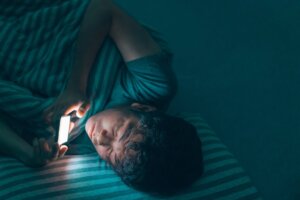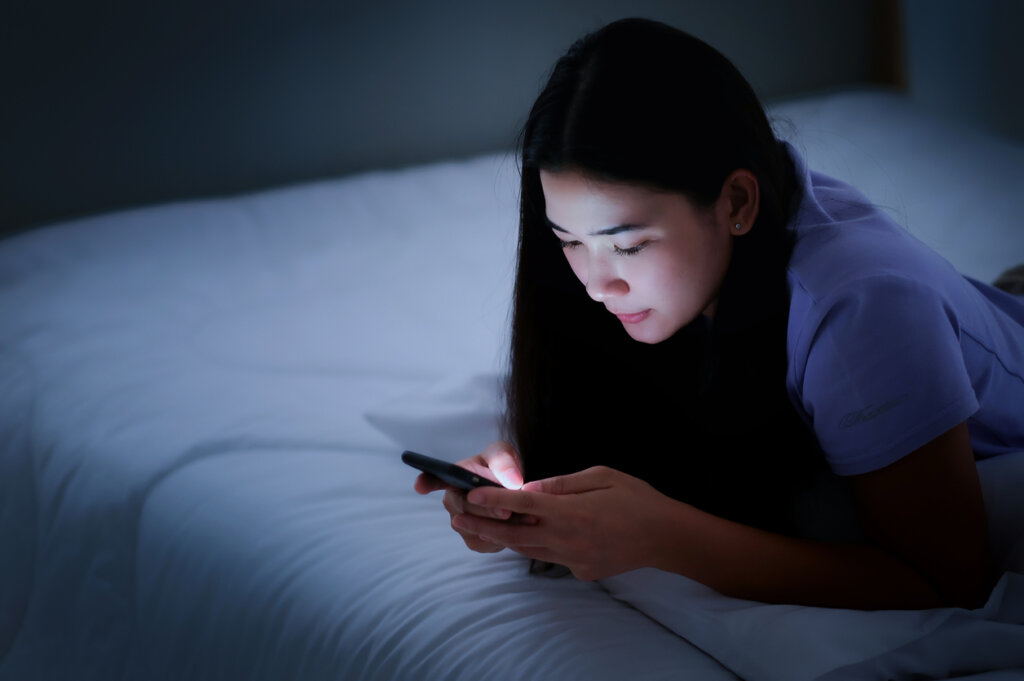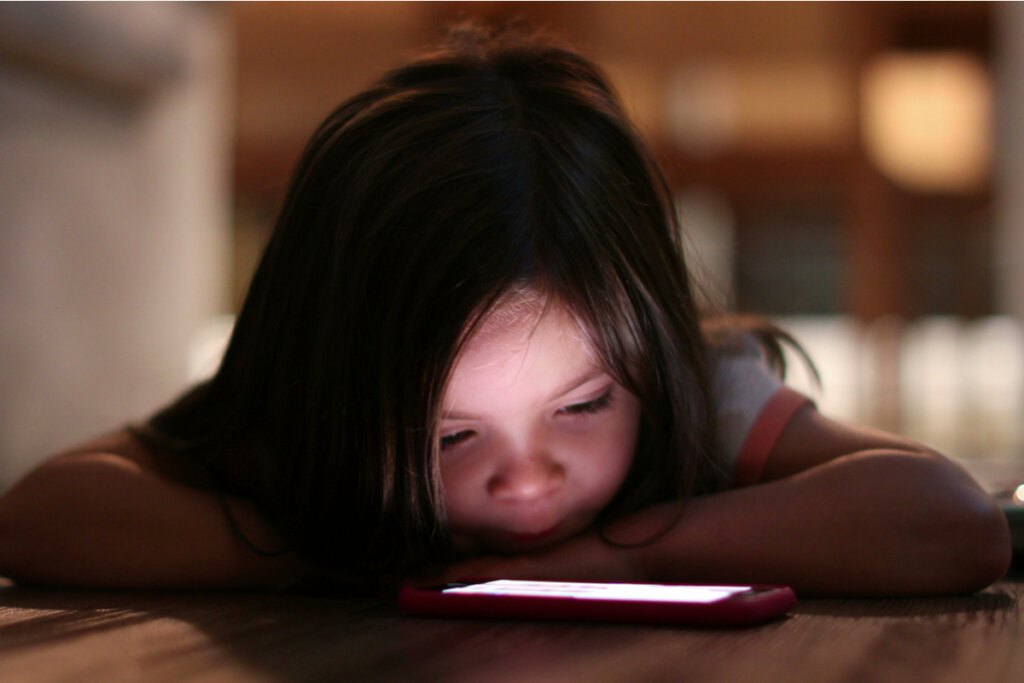The Risks of Nighttime Cell Phone Use for Teens


Written and verified by the psychologist Valeria Sabater
The temptation to look at our cell phones when we hear a notification is overwhelming. Most of us can’t help it, no matter if it’s day or night. However, the use of cell phones at times when we should be sleeping is affecting our health. We spend hours in front of our screens and our lives are passing us by without us even realizing it.
This is already a problem in the adult population but it’s even more prevalent among teens. In fact, research claims that almost 94 percent of children between the ages of 11 and 18 check their social media when in bed. Moreover, 68 percent admit that the time they spend on their cell phones at night affects their academic performance.
We should mention that this isn’t a new problem. Indeed, tiredness, problems with focusing attention in class, and higher levels of stress are increasingly prevalent among teens today. A lack of good quality sleep among youngsters can have serious effects on their physical and mental health.
As parents, we shoud lead by example. Therefore, if we want to demonstrate the proper use of technology to our teens, we should leave our cell phones in a drawer at night and not take them into our bedrooms.

The quality of teens’ sleep
Murdoch and Griffith Universities in Australia conducted an interesting study in 2018. Researchers tracked the use of electronic devices by a sample of 1,000 students between the ages of 13 and 16. It’s common for teens to use their cell phones at night. They don’t just look at their messages. They spend time on social media, posting, replying to messages, and talking with their friends.
This means that, throughout the night, they sleep on average for about six and a half hours, far less than they need. However, for youngsters between the ages of 13 and 18, it’s recommended that they rest between eight and ten hours a day. Unsurprisingly, the researchers of this study noted that a lack of sleep translated into profound changes in teens’ behaviors and personalities.
They found that a poor night’s rest due to cell phone use translates into more aggressive behavior, low self-esteem, and changes in mood. When these habits are maintained throughout secondary education, it’s common to see problems in the psychosocial adjustment of adolescents. As a matter of fact, sleeping poorly conditions their whole lives. It wears them out and undermines their motivation, energy, and even character.
The use of cell phones has become so ingrained in the lives of young people that it robs them of hours of sleep and even their happiness in many cases.
Stress, depression, and worse life satisfaction
For teens, using the cell phone at night is like taking an addictive drug they can’t kick. The worst thing is that they tend not to be aware of its addictive power or the cost it has to their health. Behind the screen, another world opens up on which they focus all their attention. It’s there where they interact, discover the world, and even build their identities.
Without a doubt, the biggest problem is the absolute dependence they have on their cell phones. Although cell phone usage is a subject that’s been addressed on many occasions, there hasn’t been much said about the effect of using them when we should be resting. However, research published in the journal, Nature provides some compelling data on the subject.
This study claims that late-night cell phone use by young people is associated with higher perceived stress and depressive symptoms. Apparently, parents and teachers often notice that their teens are moody and experience performance problems at school. Nevertheless, they usually attribute these characteristics to adolescence itself and the challenges of this stage.
Therefore, they’re not always aware that, behind their teens’ apathy, irritability, and tiredness, lie sleep disorders due to using their electronic devices at night.
Children and adolescents are suffering increasingly more from cyberbullying. If we let them use cell phones without supervision and at night, we’re putting them in danger.

What can we do about teens’ use of cell phones at night?
Teens need eight to ten hours of sleep each night. Therefore, if they get used to resting for six hours or less in a sustained manner over time, their health will be affected in multiple ways. Their brains will undergo various metabolic and neurological changes. Their stress will rise and their executive functions start to fail. For instance, memory, attention, and problem-solving abilities.
There’s a direct relationship between lack of sleep and depression. This can be a ticking time bomb in teens and translate into school failure, maladjusted behaviors, low self-esteem, and psychosocial problems. To think that the origin is in the use of cell phones at night may seem surprising but it’s not.
In fact, in many cases, they’ve developed an addiction, but one that’s been normalized. It’s altering their quality of life. What can be done about it?
Remove all electronic devices from bedrooms at night
If we want to safeguard the health of our children and teens, we must educate them on the proper use of technology. This means that, from when they’re little, they must learn that using their cell phone at night isn’t allowed. They need to know that this is something that’s not negotiable and that it’s for their own benefit.
That said, we must also lead by example. We cant ask them to do something if we don’t do it ourselves. So, we should make sure they see us also leaving our electronic devices outside our bedrooms.
Turn off devices two hours before bed
The light from electronic screens acts as a powerful stimulant for our brains. They alter the release of melatonin and consequently affect our sleep cycles. Therefore, it’s recommended that we turn off all electronic devices (computers, tablets, cell phones) two hours before going to bed.
Adults, teens, and children must comply with this rule. It concerns establishing a culture of good use of technology at home, making it our ally and not a danger to our health.
Finally, it’s highly likely that our teens will protest and even challenge us. Indeed, it’ll be extremely difficult for them to remove the cell phone from their lives when they’re so used to using it at night. However, their well-being and health are our priorities and sometimes, painful decisions have to be made to promote them.
The temptation to look at our cell phones when we hear a notification is overwhelming. Most of us can’t help it, no matter if it’s day or night. However, the use of cell phones at times when we should be sleeping is affecting our health. We spend hours in front of our screens and our lives are passing us by without us even realizing it.
This is already a problem in the adult population but it’s even more prevalent among teens. In fact, research claims that almost 94 percent of children between the ages of 11 and 18 check their social media when in bed. Moreover, 68 percent admit that the time they spend on their cell phones at night affects their academic performance.
We should mention that this isn’t a new problem. Indeed, tiredness, problems with focusing attention in class, and higher levels of stress are increasingly prevalent among teens today. A lack of good quality sleep among youngsters can have serious effects on their physical and mental health.
As parents, we shoud lead by example. Therefore, if we want to demonstrate the proper use of technology to our teens, we should leave our cell phones in a drawer at night and not take them into our bedrooms.

The quality of teens’ sleep
Murdoch and Griffith Universities in Australia conducted an interesting study in 2018. Researchers tracked the use of electronic devices by a sample of 1,000 students between the ages of 13 and 16. It’s common for teens to use their cell phones at night. They don’t just look at their messages. They spend time on social media, posting, replying to messages, and talking with their friends.
This means that, throughout the night, they sleep on average for about six and a half hours, far less than they need. However, for youngsters between the ages of 13 and 18, it’s recommended that they rest between eight and ten hours a day. Unsurprisingly, the researchers of this study noted that a lack of sleep translated into profound changes in teens’ behaviors and personalities.
They found that a poor night’s rest due to cell phone use translates into more aggressive behavior, low self-esteem, and changes in mood. When these habits are maintained throughout secondary education, it’s common to see problems in the psychosocial adjustment of adolescents. As a matter of fact, sleeping poorly conditions their whole lives. It wears them out and undermines their motivation, energy, and even character.
The use of cell phones has become so ingrained in the lives of young people that it robs them of hours of sleep and even their happiness in many cases.
Stress, depression, and worse life satisfaction
For teens, using the cell phone at night is like taking an addictive drug they can’t kick. The worst thing is that they tend not to be aware of its addictive power or the cost it has to their health. Behind the screen, another world opens up on which they focus all their attention. It’s there where they interact, discover the world, and even build their identities.
Without a doubt, the biggest problem is the absolute dependence they have on their cell phones. Although cell phone usage is a subject that’s been addressed on many occasions, there hasn’t been much said about the effect of using them when we should be resting. However, research published in the journal, Nature provides some compelling data on the subject.
This study claims that late-night cell phone use by young people is associated with higher perceived stress and depressive symptoms. Apparently, parents and teachers often notice that their teens are moody and experience performance problems at school. Nevertheless, they usually attribute these characteristics to adolescence itself and the challenges of this stage.
Therefore, they’re not always aware that, behind their teens’ apathy, irritability, and tiredness, lie sleep disorders due to using their electronic devices at night.
Children and adolescents are suffering increasingly more from cyberbullying. If we let them use cell phones without supervision and at night, we’re putting them in danger.

What can we do about teens’ use of cell phones at night?
Teens need eight to ten hours of sleep each night. Therefore, if they get used to resting for six hours or less in a sustained manner over time, their health will be affected in multiple ways. Their brains will undergo various metabolic and neurological changes. Their stress will rise and their executive functions start to fail. For instance, memory, attention, and problem-solving abilities.
There’s a direct relationship between lack of sleep and depression. This can be a ticking time bomb in teens and translate into school failure, maladjusted behaviors, low self-esteem, and psychosocial problems. To think that the origin is in the use of cell phones at night may seem surprising but it’s not.
In fact, in many cases, they’ve developed an addiction, but one that’s been normalized. It’s altering their quality of life. What can be done about it?
Remove all electronic devices from bedrooms at night
If we want to safeguard the health of our children and teens, we must educate them on the proper use of technology. This means that, from when they’re little, they must learn that using their cell phone at night isn’t allowed. They need to know that this is something that’s not negotiable and that it’s for their own benefit.
That said, we must also lead by example. We cant ask them to do something if we don’t do it ourselves. So, we should make sure they see us also leaving our electronic devices outside our bedrooms.
Turn off devices two hours before bed
The light from electronic screens acts as a powerful stimulant for our brains. They alter the release of melatonin and consequently affect our sleep cycles. Therefore, it’s recommended that we turn off all electronic devices (computers, tablets, cell phones) two hours before going to bed.
Adults, teens, and children must comply with this rule. It concerns establishing a culture of good use of technology at home, making it our ally and not a danger to our health.
Finally, it’s highly likely that our teens will protest and even challenge us. Indeed, it’ll be extremely difficult for them to remove the cell phone from their lives when they’re so used to using it at night. However, their well-being and health are our priorities and sometimes, painful decisions have to be made to promote them.
All cited sources were thoroughly reviewed by our team to ensure their quality, reliability, currency, and validity. The bibliography of this article was considered reliable and of academic or scientific accuracy.
- Adams SK, Daly JF, Williford DN. Adolescent sleep and cellular phone use: recent trends and implications for research. Health Serv Insights. 2013 Oct 3;6:99-103. doi: 10.4137/HSI.S11083. PMID: 25114565; PMCID: PMC4089837.
- Dissing, A.S., Andersen, T.O., Jensen, A.K. et al. Nighttime smartphone use and changes in mental health and wellbeing among young adults: a longitudinal study based on high-resolution tracking data. Sci Rep 12, 8013 (2022). https://doi.org/10.1038/s41598-022-10116-z
This text is provided for informational purposes only and does not replace consultation with a professional. If in doubt, consult your specialist.







